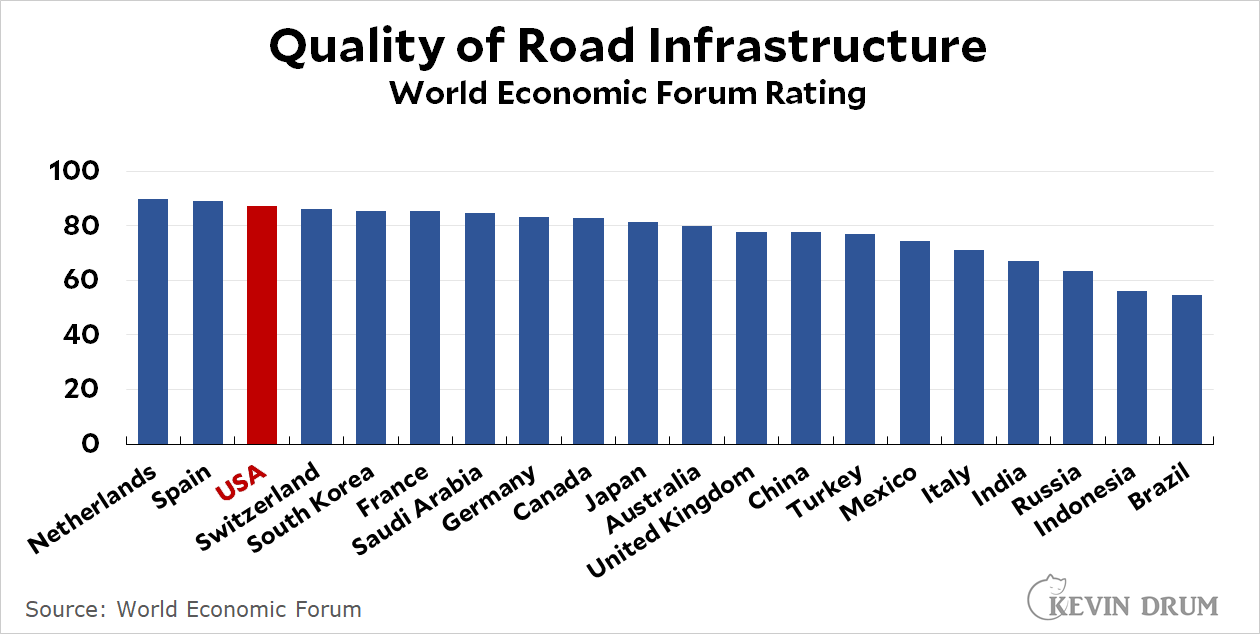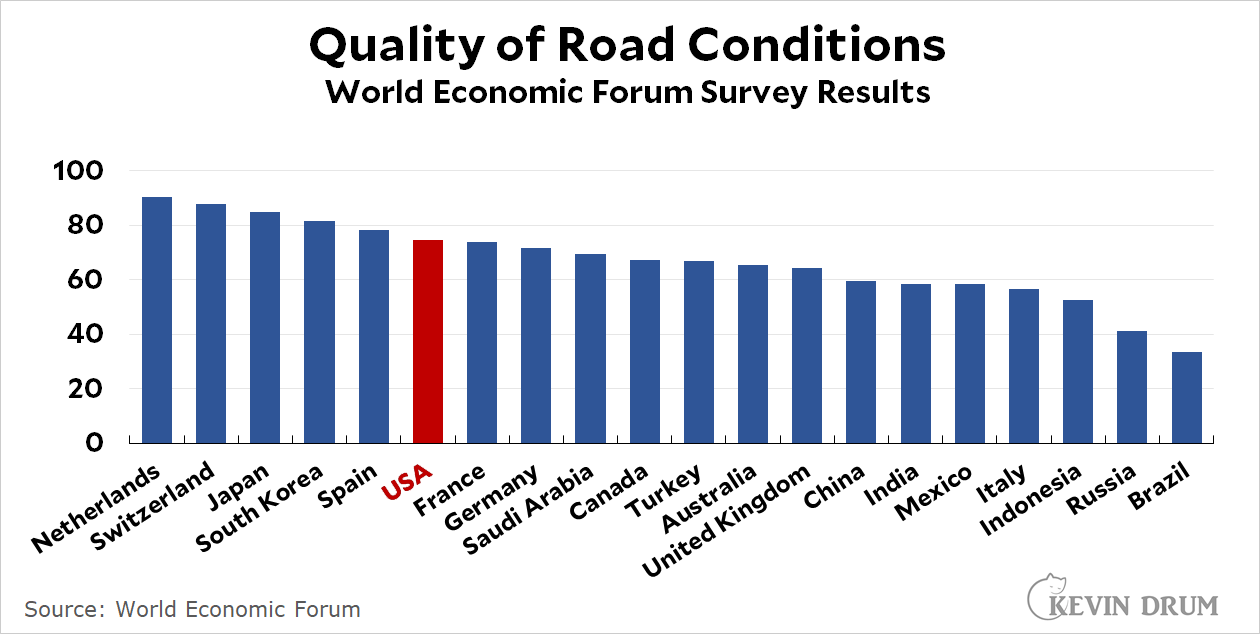My earlier post about bridge failures was a bit of a dog's breakfast, so I was left still wondering how our roads compare to other countries. I don't have any axe to grind here; I'm just scratching a curiosity itch.
In any case, the data on this appears to be surprisingly sparse. The only thing I could find was a table of ratings put together by the World Economic Forum, and they provide two different scores. Here are their overall scores for the 20 biggest countries by GDP:

And here are their results from a survey that asks specifically about road condition:

I don't have any independent view of how reliable these rankings are, but maybe they're better than nothing? Maybe. They probably provide at least a rough idea of how good the roads are in various large countries.
POSTSCRIPT: Why did I choose the 20 biggest countries by GDP? Because using a consistent metric eliminates selection bias, and GDP provides a nice mix of rich countries and large developing countries.

I've driven quite a bit in France and Italy and I would say that the major roads are in somewhat better shape. Of course, unlike California, many of them are toll roads. Of course, there is no comparison between US passenger rail service and most of the EU. For some reason, we are incapable of building a decent train. Heck, we can't even build things as good as the PCC trolley cars from 60 years ago. Let's face it, when it comes to non-automobile infrastructure, the US is a 3rd world country, if that.
If I understand the methodology behind the ratings correctly, the scores are based upon the self-reported opinions of people living in those countries rather than some objective comparative analysis between the countries. That of course dooms the results to being infiltrated by a great deal of subjectivity. But maybe it still is good enough to provide a very rough comparison? No idea! But I would say, anecdotally, that the roads in Germany by and large are constructed to a higher standard and are in better condition than the roads in the US. I just wish Germany had more street lighting or at least reflectors to better mark the lanes -- driving in the dark through the rain here can be very tense.
A U.S. national average is almost meaningless because of the wide variations from one state to another (to drill no deeper). In any case, the "problem" of infrastructure must be gauged by its worst manifestations.
...and all of that is eclipsed by the fact that (if this passes, or even if it does not) we are about to find out the hard way that there are no longer any engineers.
How about quality of rail roads?
Road quality for the entire country is a useless metric. I've driven roads in Maine that were as smooth as glass. But here in Massachusetts there are potholes on the highway that will destroy your axles. And I don't mean recent potholes, ones that people have known about going on years.
There's a climate zone in the northern US (but the not the farthest north) that sees repeated cycles of freeze and thaw in the winter and that's hell on roadways. When I lived in Michigan (22 years ago now) it was the case that the northern parts of the state had less trouble with potholes than the southern parts, where even in richer communities like Ann Arbor and the Bloomfields the roads turned into Crater Ways every year.
I wonder how "road infrastructure" and "road conditions" are defined. For a rough survey this seems strangely granular.
Not long ago on this very blog there was a different graph from the same source that was highly improbable on its face. Do they know what they are doing?
One important information would be what sort of roads are included. I bet local roads are not among them. US roads are generally in worse shape than I have observed in Europe. But it is local roads that are the worst--and not even in poor towns--that are the worst. Go look in Palo Alto or Los Alto California or Newton Massachusetts. Ride your bicycle around those potholes. It is worse than anywhere I have ever been. I'd predict the roads are better in Nairobi than in Newton, Newton is so bad!
Why, then, is it "common knowledge" that "America's infrastructure is crumbling?" I know the streets and freeways in Southern California that I drive on are pretty crappy, and the smaller airports (but still big enough to land 737s) feel like you might run into Bogie and Bergman saying farewell on the tarmac. But now KD posts these charts suggesting that things aren't so bad after all.
Of course, the charts do say that the U.S. is not Number One (in bridges and roads), so maybe that qualifies as crumbling infrastructure.
Crumbling infrastructure may not be common knowledge, but I recall that the Smithsonian magazine published an article years ago that described what seemed like an already urgent situation involving not just roads & bridges (& dams?) but deteriorating water infrastructure underneath major cities. It made me wonder ever since about the unseen dangers as much as the obvious transportation risks.
Here (NZ) we have a "measure" that is used for Infrastructure
We look at the average AGE of the infrastructure
Everything that we build has a lifetime so it will need to be repaired/replaced - by tracking the average AGE we can instantly see if the local government that "owns" that infrastructure is "keeping up" - if they are doing the required maintenance/replacement then the average age of the infrastructure will remain the same
If they do nothing then every year it will become another year older
Its a Red Queens Race - you need to run to stay in the same place
But reporting the AGE of the infrastructure stops the Local Governments from "saving money" by cutting down on maintenance
Having lived in the Netherlands, this makes sense. Also, for all our whining about our 'terrible' roads and bridges, especially when compared to massive new construction in China, it's always good to look at a country's infrastructure in the whole. I've also lived in China, and you don't have to go too far off those shiny new roads to hit some really bad ones.